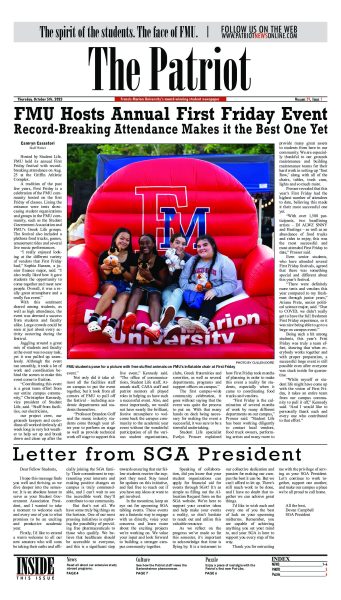The Patriot Position: When class goes over
“The bell doesn’t dismiss you; I dismiss you.”
The editorial staff at “The Patriot” has heard this line several times during high school as class periods ended, and that mentality has carried into college. As students start to pack their bags, professors often will lecture the students on their rudeness and hold them over for two or three minutes.
Assistant Editor Rebekah Davis has a firsthand example of this. One of her professors notoriously holds class two minutes over. This professor will get onto the class for packing up right when class is over. So we all sit there until that professor finishes speaking, and we rush to the door.
What the professor probably doesn’t know is that she has to rush to the third floor of LSF for her chemistry class in seven minutes. If she has to use the restroom, that takes away three minutes. That class comes right around lunch, so if she has an apple to eat, she has to somehow cram it in because her next professor doesn’t allow eating in class. Thankfully, her chemistry professor doesn’t lock the door, but it’s always a mad dash to get there.
The rush that students have to go through every day to get from class to class is unhealthy. There are three main issues that rushing to class causes: higher risk of urinary and bladder infections as well as higher risk of overeating and digestive problems.
Individuals who wait to use the restroom have a higher risk of urinary tract infections and bladder infections, according to Huffington Post. When people wait to use the restroom, their bladders expand. Dr. Chamandeep Bali told the Huffington Post that when the bladder expands, it often loses the ability to send a signal to the brain saying that it’s full. That allows bacteria to grow, and those bacteria cause infections.
When professors go over their class time, they may be creating unhealthy conditions for their students. Students can feel that they don’t have time to use the restroom between classes, so their bodies become more susceptible to infections.
Students who rush to grab a bite in between classes have increased risks of indigestion and gastroesophegeal reflux disease, according to a New York Times article. A study done by Medical University of South Carolina showed that individuals who ate a fast food meal quickly had 14 episodes of acid reflux, yet those who ate more slowly only had 10.
In addition to indigestion and acid reflux, the New York Times article also said that individuals who eat quickly are more likely to be obese. An American Diabetic Association study showed that individuals who ate slowly felt more full while consuming fewer calories than those who ate quickly.
Since students only have 10 minutes to get to the next class, many have to rush to eat their lunches, leaving them feeling less satisfied and tempting them to overeat when their classes are over.
Those are a few negative physical effects of rushing, not to mention the stress and adrenaline association with running to class, trying to accomplish everything and still be on time.
It’s understandable that professors want to get to a stopping point in their lectures. It’s understandable that they want to make sure that their students get their money’s worth of class time. But they should also consider what can happen to a student who has to rush because instead of 10 minutes, they have seven or eight.
The only other way to solve this problem would be to increase breaks between classes by five minutes, which would probably be healthier as a whole, but classes would start later. It’s a choice that the professors and administration have to make.




